How the Media Covered Clyde Drexler's 1995 Trade Request
In the second of a two-part series, a look at how local and national media outlets covered the divorce of Drexler and the Trail Blazers.
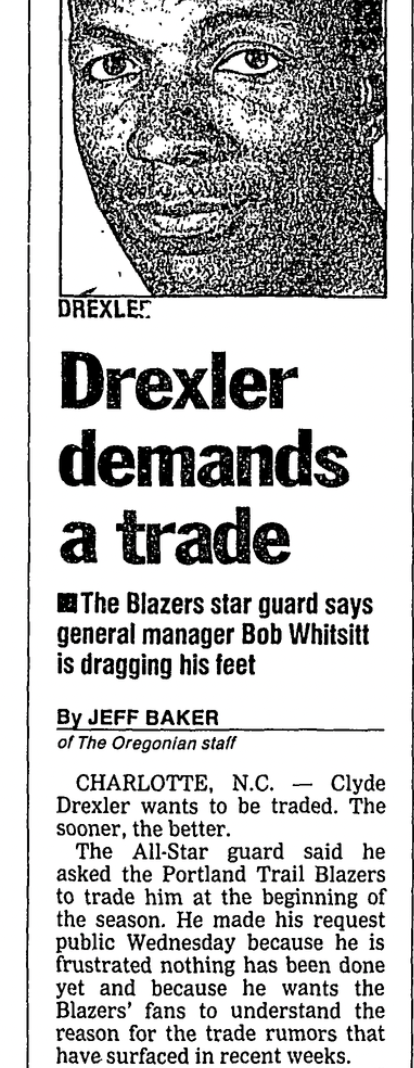
The Oregonian (Jan. 5, 1995)
It’s been nearly a month since Damian Lillard requested a trade out of Portland on July 1. Almost nothing has actually happened as it relates to the situation, in terms of substantive trade talks between the Trail Blazers and Miami Heat, or any other team. But that hasn’t stopped it from being a talking point all over the media every single day, which it will continue to be until Lillard is traded—or not.
Early on in this ordeal, I became curious how the coverage of Lillard’s trade request different from those of Bill Walton in 1978 and Clyde Drexler in 1995. Last week, we dove into newspaper and magazine articles around Walton’s exit from Portland; today, we take a look at Drexler.
There are obvious differences between those two situations and Lillard’s. Walton’s trade request was driven by his concerns over the Blazers’ medical staff’s handling of his foot and ankle injuries, which he believed to be unethical. Drexler’s was about money, but also about wanting a chance to contend when the Blazers were clearly going young. Money isn’t a factor with Lillard—he’s been paid extremely well in his time in Portland—but the other concerns, and the rhetoric around them, are very similar to Drexler’s exit.
One big difference I found is that while Walton's separation from the Blazers was national news in the sports world in the late ‘70s, Drexler's trade request was barely covered outside of Portland. Reporters from outlets like Sports Illustrated and The Sporting News passed along Drexler-related trade rumors occasionally, but the story mostly flew under the radar nationally. (This probably had something to do with the fact that it played out during the start of the O.J. Simpson trial in January of 1995.)
The biggest difference between the Walton/Drexler coverage and the Lillard coverage—and maybe this is just a byproduct of social media not existing in the 1990s and every quote not getting amplified out of context on a minute-by-minute basis—is how many fewer anonymous sources there were back then. You’d see them here and there, for trade negotiations that weren’t authorized to be public. But for the most part, people just said stuff and put their name on it.
And some of the stuff Drexler said on the record about the Blazers organization, which you’ll see below, is far harsher than anything you’d see about a team from a player today, even laundered through their agent or a reporter obviously getting marching orders from one side or another.
It’s worth noting that Drexler, while he was saying these things about the Blazers, still showed up and played—very well—until he was traded. They’re different situations, but that bears pointing out.
As a side note, it was a bit of a trip to read Oregonian articles from when I was in kindergarten in the mid-’90s and see bylines from people I know personally and consider colleagues, like Dwight Jaynes and Kerry Eggers.
I’ve found this whole exercise fascinating and I hope you will, too.
The root of Drexler's disagreement with the Blazers was a dispute over his contract from a year before the trade happened. Drexler was set to make $1.5 million per year for the 1993-94 and 1994-95 seasons, and then a balloon payment of $8.75 million in 1995-96 (this was before the current max salary rules were in place). He felt, probably rightly, that he was underpaid for his stature in the NBA as then-seven-time All-Star, and wanted the Blazers to redo his contract. When they resisted, he threatened to push for a trade.
"I'm still very unhappy," Drexler said in October of 1993. "I think something needs to be done. I'm not going to say anything negative in public or make any threats, but if nothing happens, you may see me take some action. I'm here right now, playing in these games, and after that, we'll take it day to day."
He added: "If they don't want to pay me, there are other teams out there that will."
Oregonian columnist Dwight Jaynes was critical of Drexler, calling his threats "manipulative" and brought up the fact that he had yet to deliver a championship to Portland.
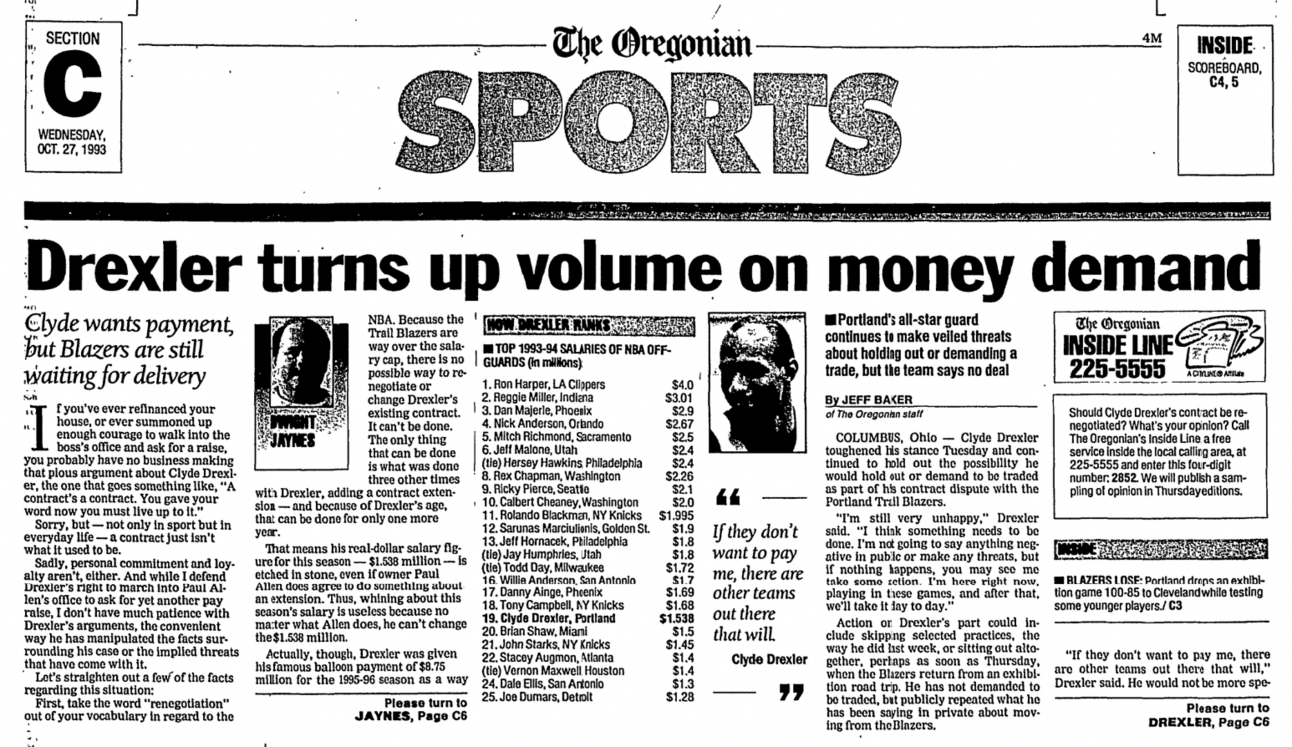
The Oregonian (Oct. 27, 1993)
The Blazers and Drexler agreed to table his contract talks for the year; chatter picked up again after the 1994 playoffs, when Portland lost in four games to Houston in the first round. Immediately following that series, speculation began about the futures of head coach Rick Adelman and general manager Geoff Petrie, as well as some of the core parts of the Blazers' late '80s-early '90s contenders. It wasn't hard to figure out that two younger players, guard Rod Strickland and forward Cliff Robinson, were considered more integral to the future than some of those veterans.
"Two mainstays of the recent past, Clyde Drexler and Terry Porter, are more likely to be traded, although there might not be much demand for them," Oregonian beat writer Jeff Baker wrote the day after the loss to the Rockets.
That same week, Jaynes wrote that there was a divide in the organization, with Petrie and Adelman on one side and president of player personnel Brad Greenberg on the other side, and there were questions about which faction had the ear of owner Paul Allen.
"On one side of the battle lines is player personnel chief Brad Greenberg, who just can't seem to understand why all the marvelous young players he has drafted aren't getting more of a chance to play," Jaynes wrote. "Greenberg has very few allies inside the Blazers' offices, mainly because of what many of his co-workers have characterized as an arrogant and explosive personality.
"On the other side are Petrie, Adelman, the coaching staff and just about everyone else who has to deal with Greenberg on a regular basis. A lot of fans, eager for a change and full of the fickle feelings from what they perceive as a couple of 'losing' seasons, are ready to dump Petrie and Adelman. There is very little perspective in Portland right now, in regard to how well this team is doing in relation to its talent level."
On May 17, Jaynes wrote that Allen should stop delaying the inevitable and fire Adelman, while Drexler gave an interview to Baker that in retrospect reads an awful lot like Lillard's comments at exit interviews this April.
"I never even think about (being traded),'' Drexler said. "I hope they make their decisions soon, but you know how that goes. I do think a couple of changes need to be made in order to improve the team.
"Speaking as a player, of course, I'd like to see them make some moves to make us better, but I'm sure they feel that way, too. I'm not pointing fingers at anybody, I'm just saying there are some things that could make us better. They know it, just like everybody else does.''
The next day, Petrie resigned as general manager, a decision that surprised not only Allen but also players, many of whom went on the record with The Oregonian to call the decision "stunning."
The day after that, the Blazers fired Adelman. Drexler was reported to be unhappy with that decision.
The coaching search, which at one point was rumored to include Mike Krzyzewski, dragged out another month and eventually landed on longtime Seton Hall coach P.J. Carlesimo, who had no NBA experience.
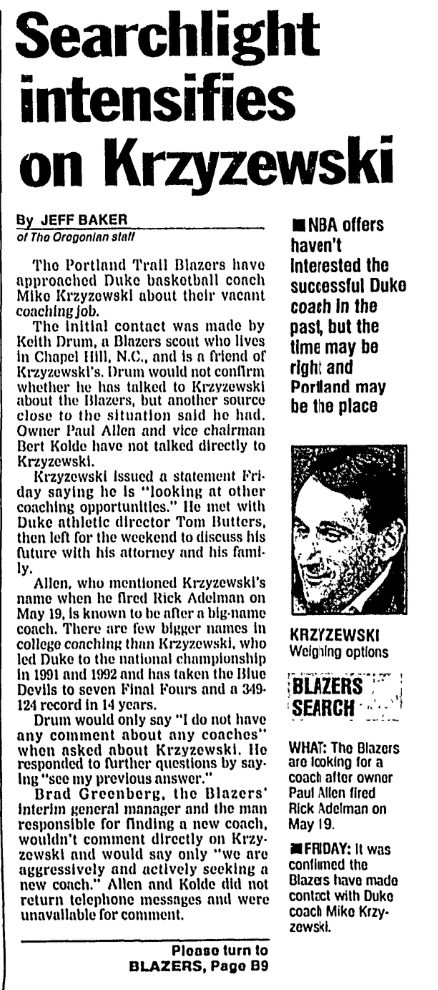
The Oregonian (May 28, 1994)
The day of the June 29 draft, Baker wrote in The Oregonian that the Blazers "would entertain offers for anyone on their roster, including Clyde Drexler." On July 12, they hired Seattle SuperSonics general manager Bob Whitsitt to replace Petrie as their new top basketball-operations executive.
The rest of the offseason was quiet on the trade front until late September, when the South Florida Sun Sentinel’s Ira Winderman, who still covers the Heat to this day, reported that the Blazers and Miami had engaged in talks about a trade of Drexler for Harold Miner. Dr. Jack Ramsay, the coach of the Blazers' 1977 title team who was working for the Heat as a television analyst at the time, said on ESPN that he'd heard the deal had real legs. There was also a rumor that the Blazers were talking with the Knicks about a deal for Drexler centered around draft picks.
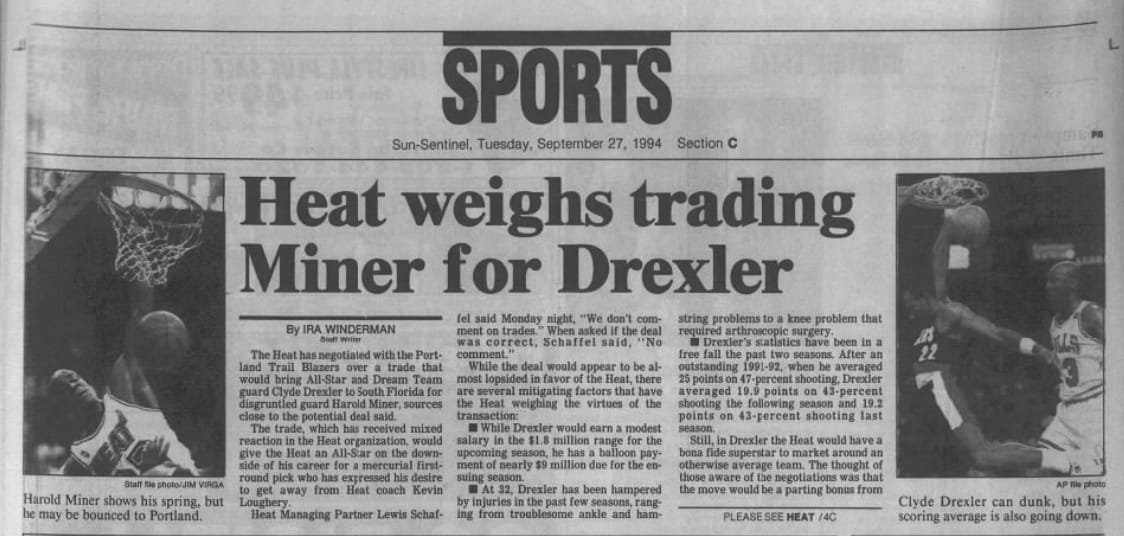
South Florida Sun-Sentinel (Sept. 27, 1994)
Drexler himself confirmed the Heat talks in an interview with The Oregonian's Kerry Eggers, saying he heard from "a good source" that the deal was getting close. He wasn't exactly against the idea.
"After being in Portland for so long, it's not like I want to go," Drexler said. "But it might be best for everybody. And Miami would be a good place for me. Nice young team, good climate, and they need a two-guard."
In the same interview, Drexler also criticized Blazers ownership for firing Adelman and letting Petrie resign.
"I don't care for some of the stuff that has been going on the last year," he said. "We've let some good people go. It doesn't sit too well with me. A part of me is hoping [the trade] will get done."
Drexler added that if he wasn't traded, his issues with the organization would not be a problem going into the final year of his contract. "It won't get in the way of my performance, I can promise that," he said.
Writing the next day in The Oregonian, Jaynes blasted the prospect of a Drexler-Miner trade, calling Miner "one of the most overrated players to come out of college in years." Jaynes wrote that, despite talk of Drexler having an attitude problem and the tension between the front office wanting to go younger and the veteran players still on the roster, "There's no way that anybody is going to convince me that this team will be better next season without Clyde Drexler."
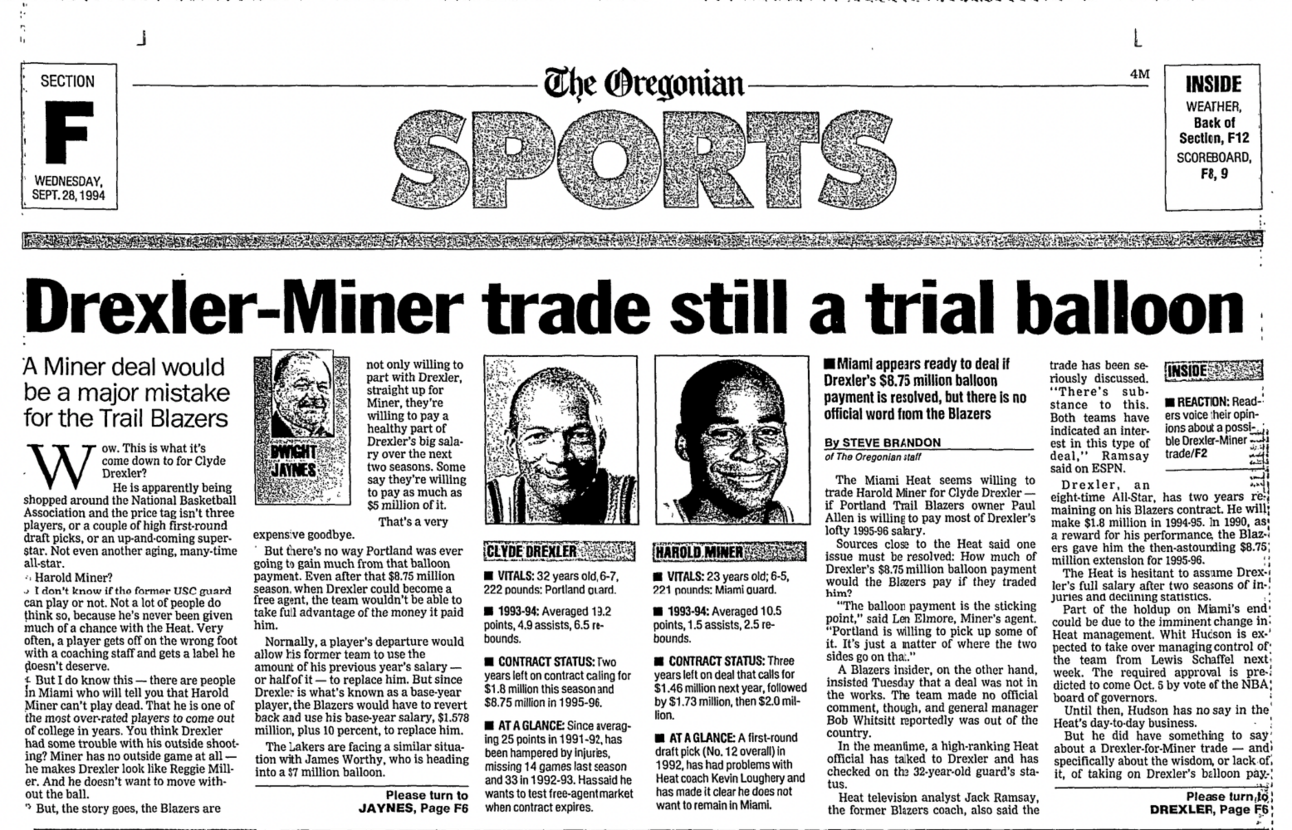
The Oregonian (Sept. 28, 1994)
The rumor appeared to be a miscommunication to begin with. Lower-level members of the Blazers' front office had had exploratory discussions about the Drexler-Miner framework with Heat management while Whitsitt was out of the country on vacation. When they ran it up the flagpole, Whitsitt immediately shot down the idea.
Still, the rumor being out there appeared to poison the well between the Blazers and Drexler, who told the local TV station KGW that nobody from the organization called him after the report surfaced.
"It shows a lack of respect," Drexler told the station. "If you give respect, you should get respect back. You have to be a man about it, and right now there's not that many men in that office, in the Blazer office. When Harry Glickman was running the franchise, everything was done on an honest basis. … I've seen that organization go from a class organization to something much different."
With the Miami talks apparently dead, training camp and the season proceeded as normal, until Jan. 5, when Drexler went public with his trade request, which he said he'd delivered to Whitsitt before the start of the season.
"I want out," Drexler said that day. "I told them at the beginning of the season — after the rumors came up with Miami — that I felt I was not being told the truth and I was not being dealt with fairly. It's nothing against the team or the coaching staff, but I think a change of scenery is best right now."
Drexler went on to rip the organization again for the departures of Adelman and Petrie, as well as their lack of communication with him around the Heat rumors that fall.
"You can't keep treating good people bad," he said. "The changes they made over the summer were terrible, in my opinion, and then the way they treated me when the Miami thing blew up. I just feel it's in my best interests to move on."
It was a bomb dropped on a middling season in which the Blazers were 14-14. The next day, Drexler scored 35 points in a win over Boston. Baker wrote in The Oregonian: "Clyde Drexler found a new way to increase his trade value Friday night and let the team he wants to leave know what life would be like without him."
After that game, Drexler declined to address the trade request with reporters, saying: "Wherever I'm at, I'll play hard."
Carlesimo, who was getting a hell of an introduction to the NBA life in his first year as a head coach, also insisted none of this was affecting the team.
"It's not something that has come onto the court at all," he said. "The players are fine, the coaches are fine, and obviously, he's fine."
The day after Drexler went public with his trade request, Jaynes wrote a scathing column in The Oregonian titled: "Go, Clyde, and Take Your Crying Towel With You."
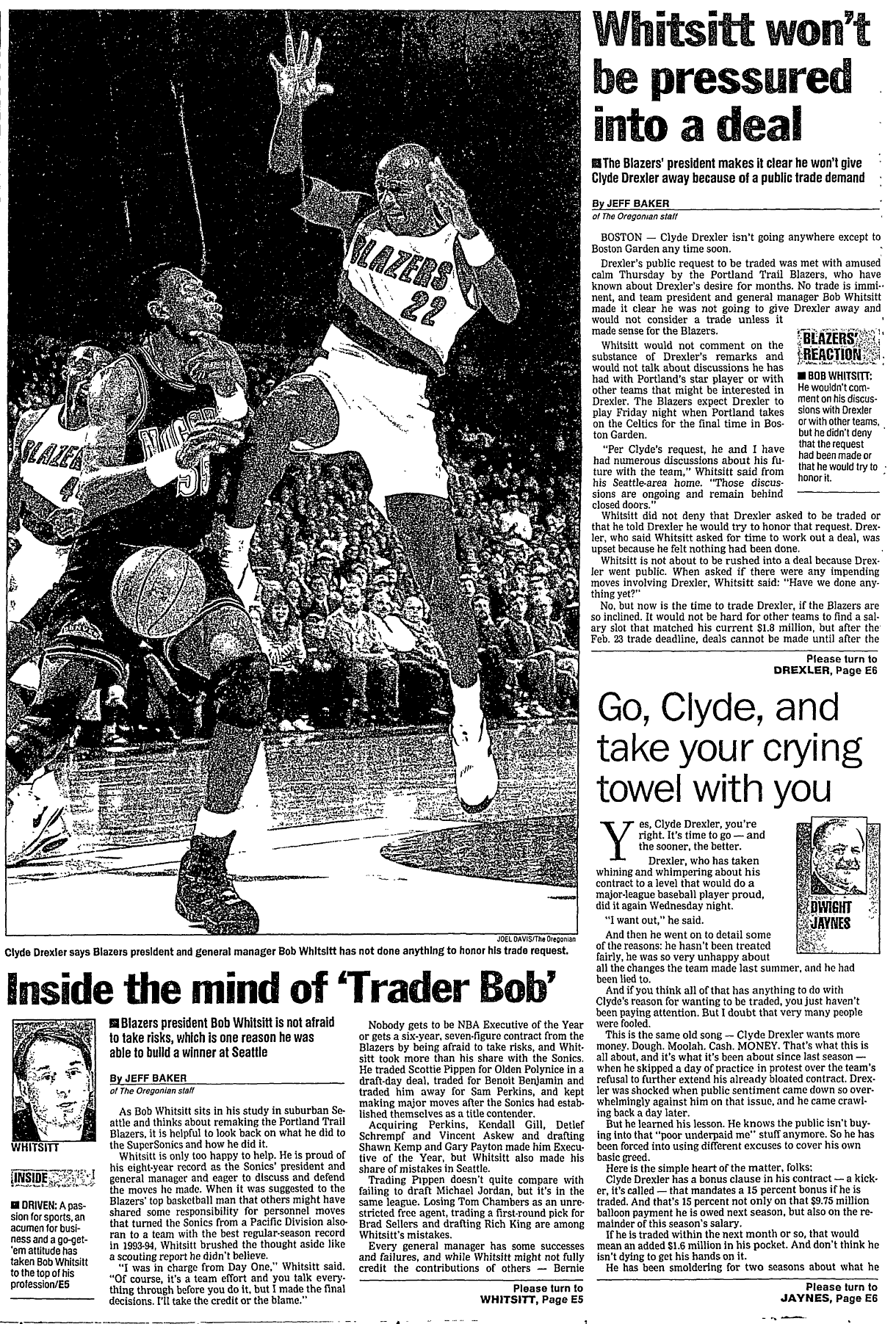
The Oregonian (Jan. 6, 1995)
"The fact is, the Portland Trail Blazers have fawned over Drexler for years," Jaynes wrote. "They've allowed him to practically run the team on the court and to bully them off it. They've done all kinds of little things to try to make him happy and have extended his contract so many times already that everyone has lost track of how often it has been done.
"But the guy always has been as good at passing the buck as he has been at passing to Buck -- and it's time to call him on it. He's trying to con somebody here. I don't know if Clyde Drexler is cash-poor or just greedy, but I think if he really wants to be traded, he's making a big mistake by forcing the issue right now."
On Jan. 8, Drexler played his first home game in Portland since the trade request and scored 31 points in a win over the Lakers.
"He has played so well this season, and especially since he declared his manifest unhappiness, that it doesn't really help the situation," Oregonian columnist J.E. Vader wrote the next day. "Another marriage analogy comes to mind: your husband announces that he is divorcing you just as soon as he can find another house, and in the meantime he loses 20 pounds and gets a raise. And you still have to live with him."
When national commentators did weigh in on the situation during this time, their take was often that it would be tough to trade Drexler because of his age and salary.
(Sound familiar?)
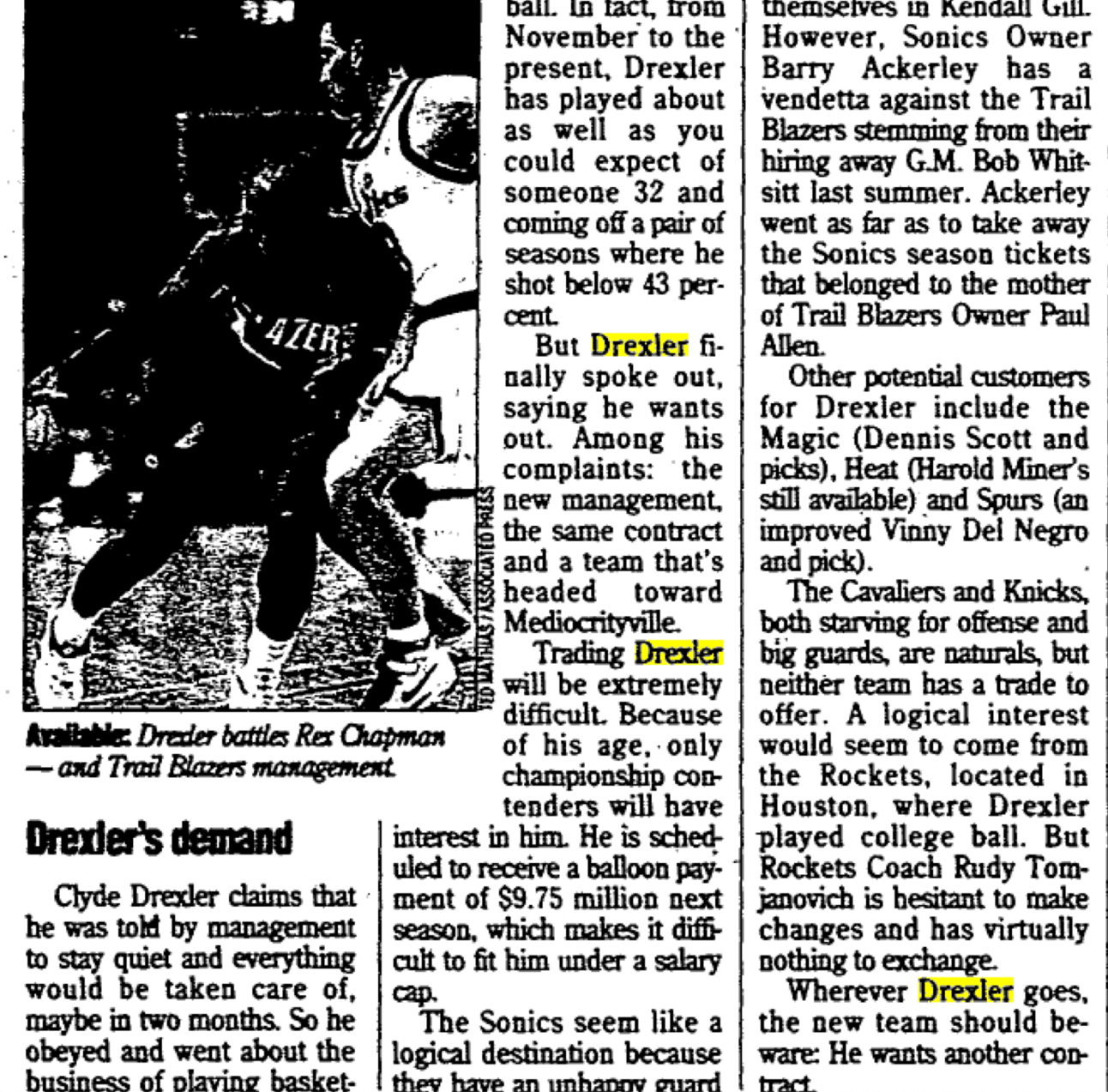
The Sporting News (Jan. 16, 1995)
Baker reported on Jan. 15 that Drexler and Whitsitt had a brief meeting in the locker room in which Drexler told the general manager that all communication between him and the team would be handled by his agent. Baker also wrote that the Rockets, Pacers, Knicks and Spurs were among the teams that had called the Blazers in the days following Drexler's trade request, although talks hadn't gotten very far with any team. Whitsitt's plan, Baker wrote, was to take a patient approach with negotiations and not make a deal that wasn't in the Blazers' best interests.
(Sound familiar?)
Jaynes went after Drexler in another column, written in the voice of the judge of the "High Court of Common Sense." After weighing the "evidence" (Drexler's public comments about his reasons for wanting to be traded), he declared him guilty of "attempted desertion."
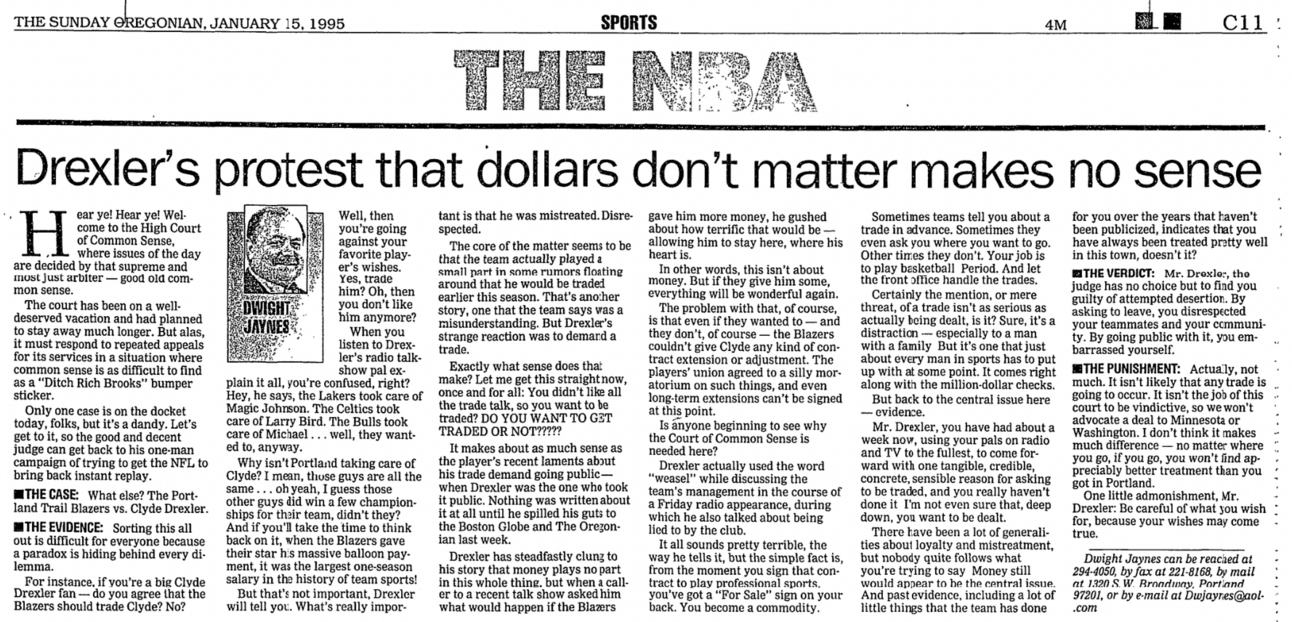
The Oregonian (Jan. 15, 1995)
"By asking to leave, you disrespected your teammates and your community," he wrote. "By going public with it, you embarrassed yourself."
Eggers, in a Jan. 18 column, pioneered the kind of outlandish Trade Machine proposal you see on Twitter (or on Bill Simmons' podcast) all the time nowadays, sending Drexler to Minnesota and, after a bunch of machinations involving Scottie Pippen, Nick Van Exel and Dennis Rodman, landed Latrell Sprewell in Portland. (Eggers couldn't possibly have predicted that Sprewell would wind up playing for Carlesimo years later in Golden State, which did not go well.)

The Oregonian (Jan. 18, 1995)
The first substantive Drexler trade rumor surfaced in late January, with Mitch Lawrence of the New York Daily News reporting, citing anonymous sources, that a trade sending Drexler to Seattle for Kendall Gill was "very close to being finalized." Drexler told reporters he knew nothing about it.
"Just like the Miami deal, huh?" he joked.
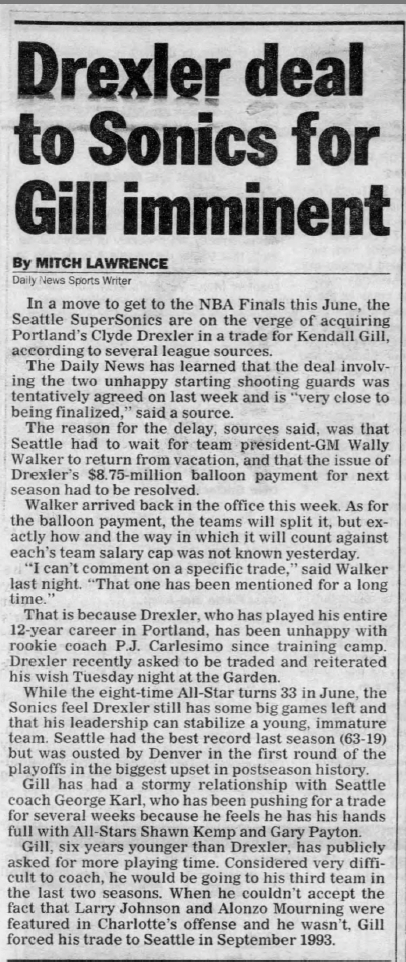
New York Daily News (Jan. 26, 1995)
In a phone interview with The Oregonian's Steve Brandon, Whitsitt ducked questions about the talks.
"He was traded and then absolutely not traded, and I didn't have to respond to it, so isn't that fun?," Whitsitt said. Would I tell you if I was even trying to trade him? We've talked. But I'm keeping my discussions with Clyde behind closed doors. If he wants to say something, that's his business."
Over All-Star Weekend, Houston and Atlanta emerged as the two likeliest trade destinations for Drexler, with New York also in the mix. Eggers reported in The Oregonian that Drexler's former college teammate, Hakeem Olajuwon, had been lobbying Rockets management to trade for him. Portland was said to be asking for Robert Horry in the deal, with Houston instead offering Carl Hererra and a first-round pick.
Two days later, the deal was done: Drexler and Tracy Murray to Houston for Otis Thorpe, a first-round pick and the draft rights to Marcelo Nicola, an Argentinian forward who never played in the NBA.
Jaynes wrote that Blazers "could have fared a lot poorer," while arguing that they gave Drexler exactly what he wanted.
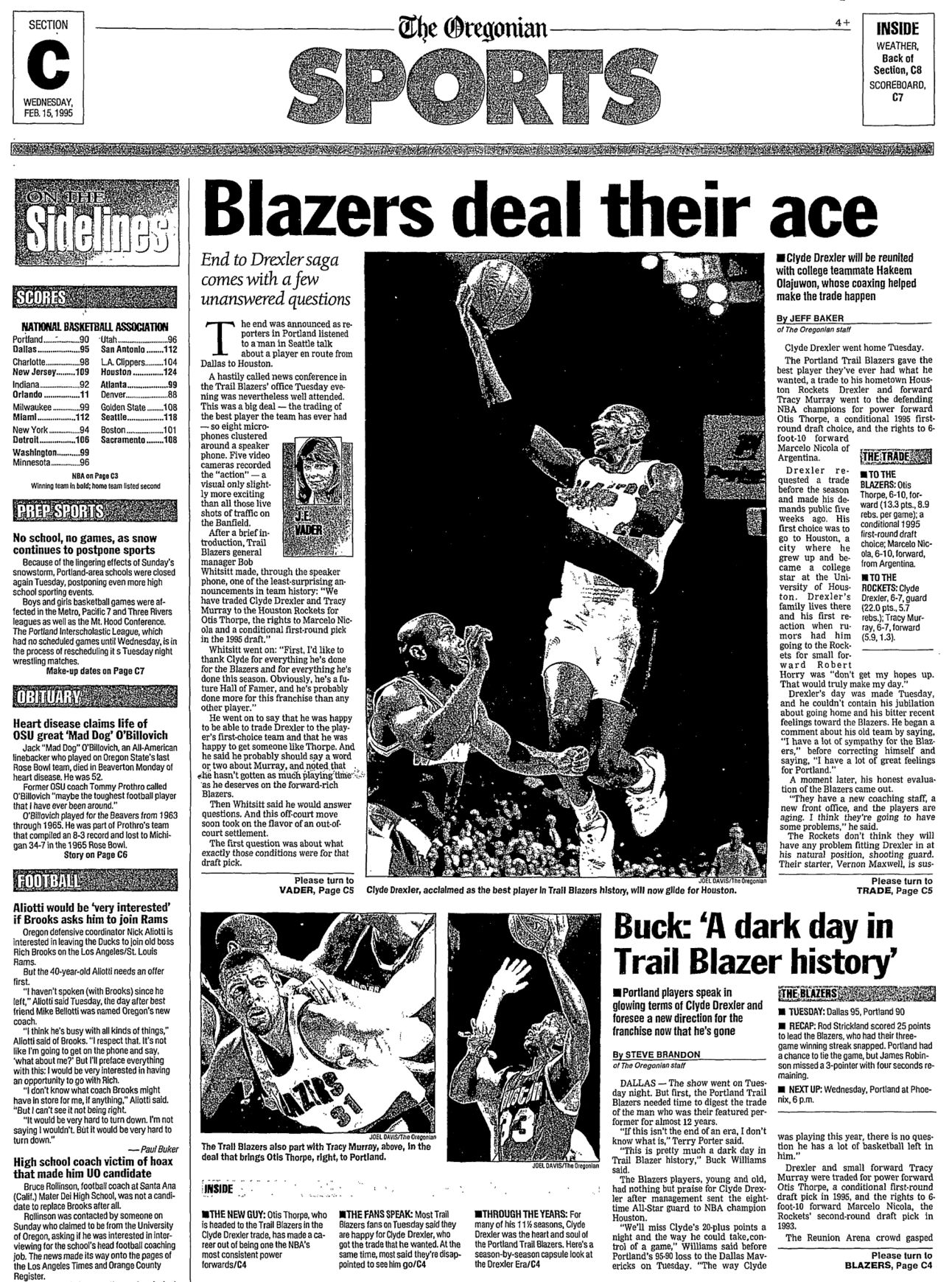
The Oregonian (Feb. 15, 1995)
Drexler and the Rockets returned to Portland on April 8. He had 24 points, 10 rebounds and six assists in the game, but his old team won handily. For all the bad feelings and public airing of dirty laundry during the lead-up to the trade, the response from the crowd was almost entirely positive.
"They wanted to show Drexler they remembered all the good times and didn't care about the bad," Baker wrote in his game story for The Oregonian. "This was No. 22, the most popular Blazer ever, back to play against the team he once defined. For once, the crowd didn't have to be reminded by the scoreboard that it was time to stand up and cheer."
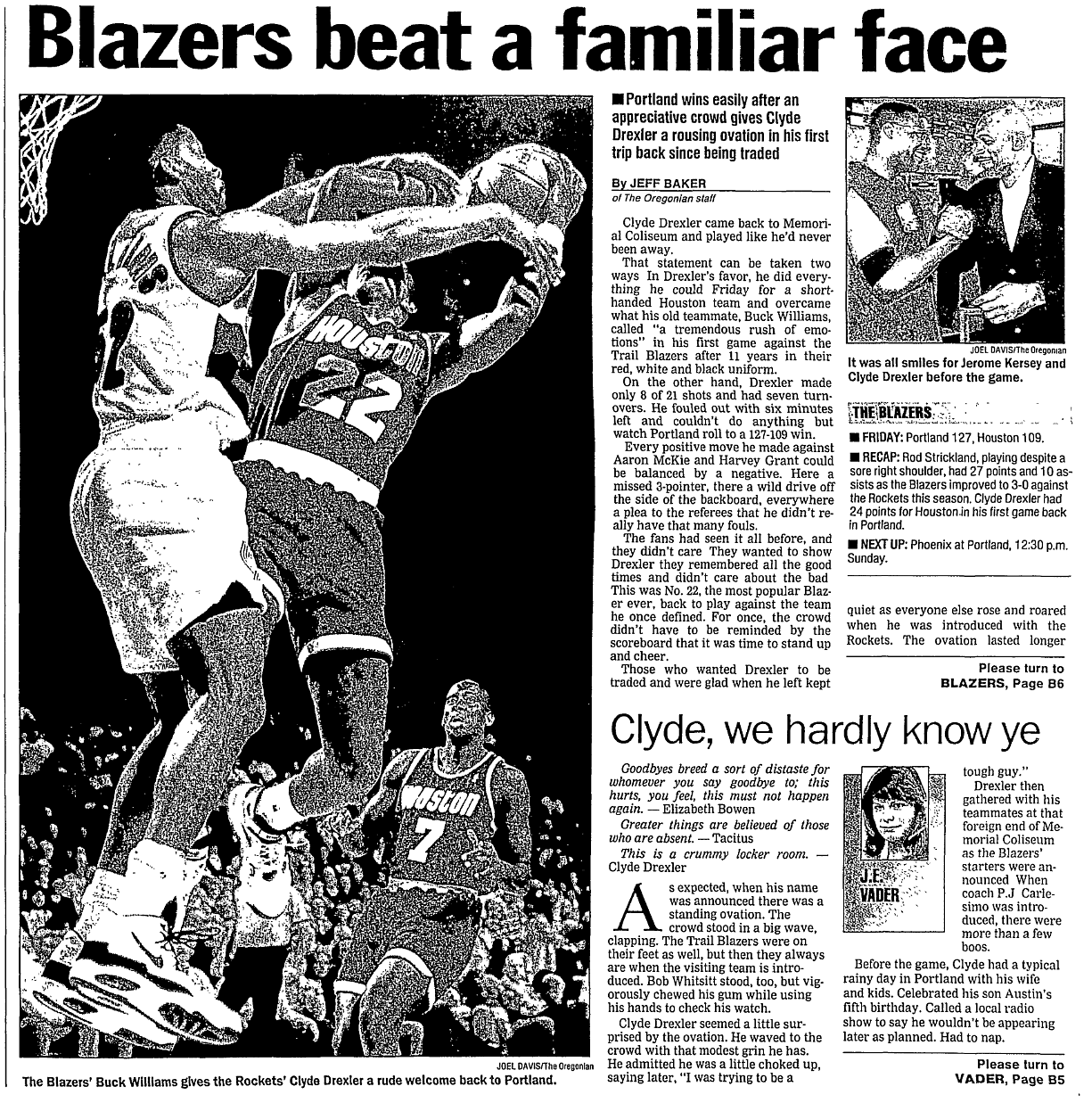
The Oregonian (April 8, 1995)
The Oregonian sent both Jaynes and Eggers to cover the Rockets' title run, which saw Drexler win the title he was never able to win with the Blazers. He was very complimentary and appreciative of the Portland fanbase afterwards.
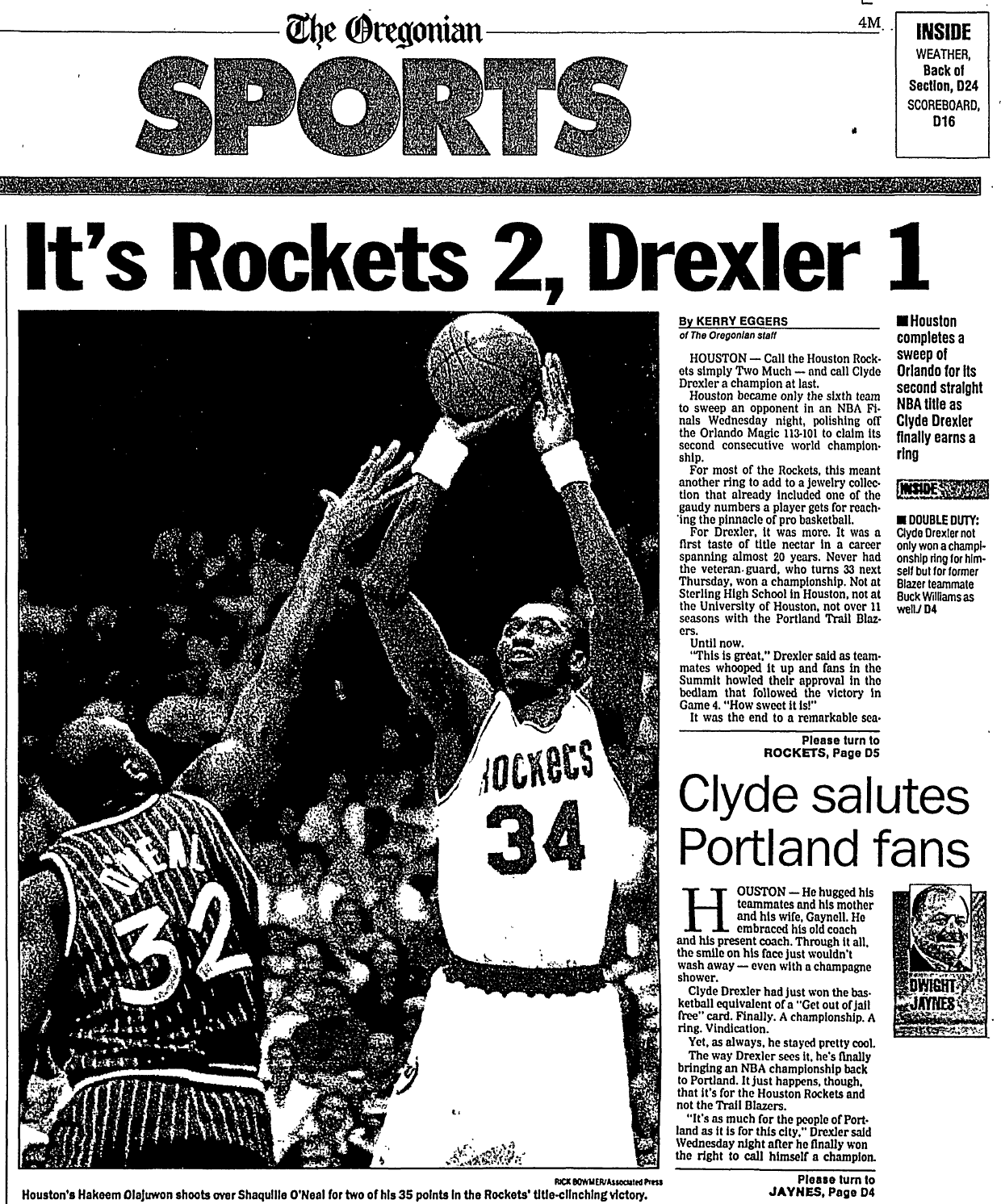
The Oregonian (June 15, 1995)
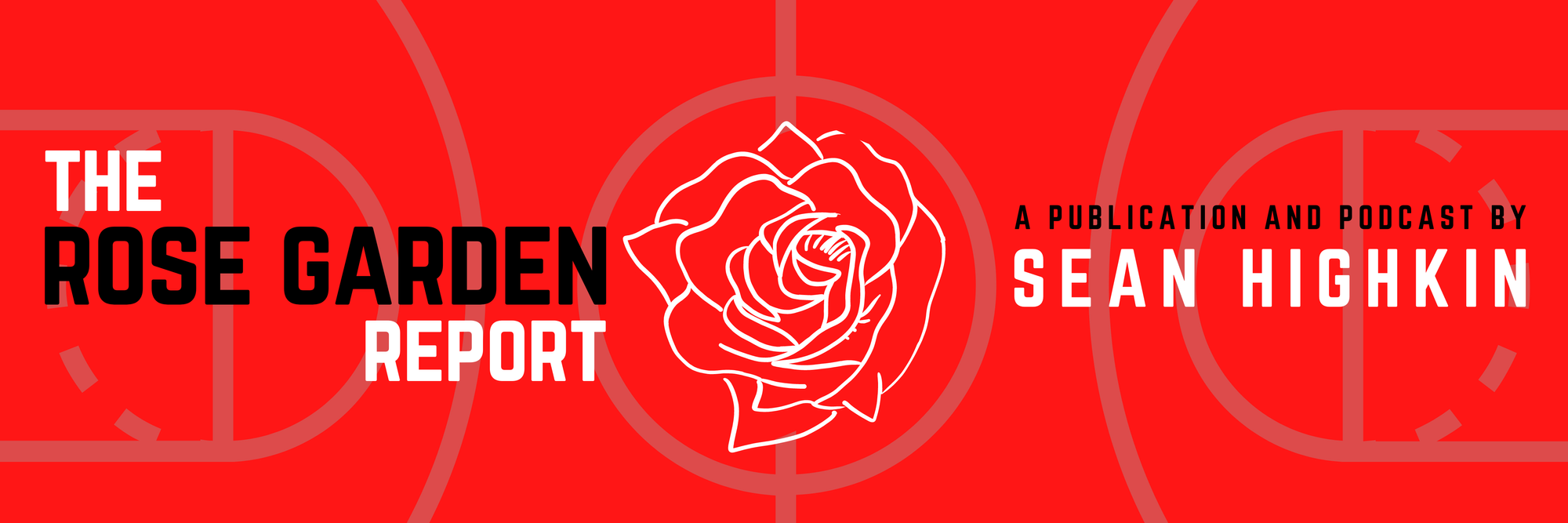
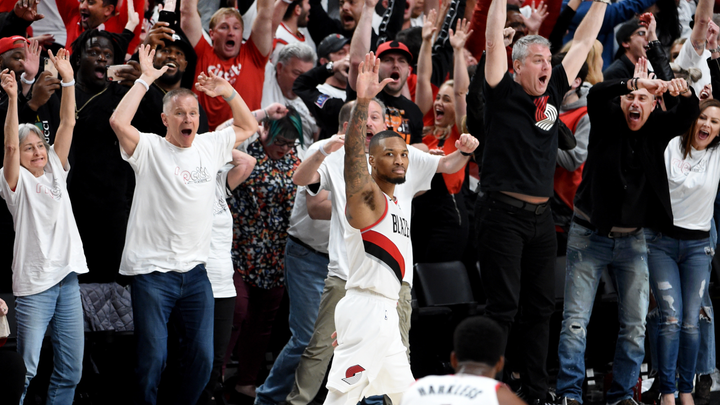
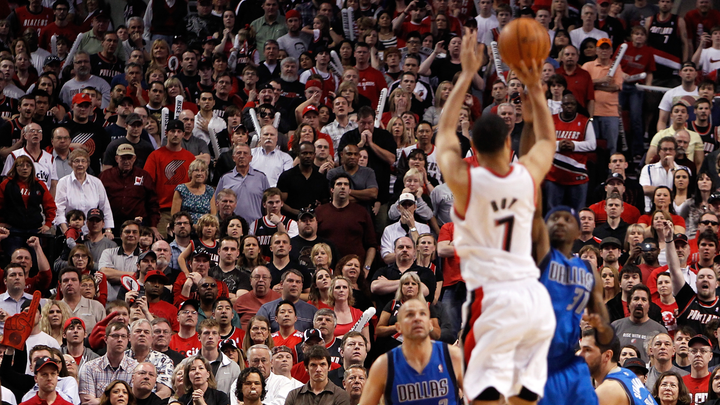

Comments ()